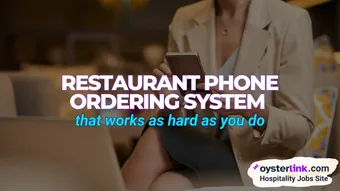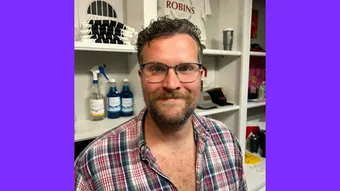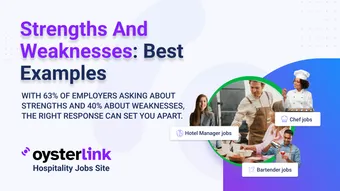Who is Bryan Holland?
Bryan Holland is a General Manager in NYC. He is a hospitality professional that has been on the scene for over a decade. Bryan knows what it takes to elevate your career, but also what it takes to destroy your career. He started his career at McDonald's and worked his way up to the General Manager position. His advice goes from the application process, over interviewing to getting promoted.
How to build a hospitality career, a General Manager perspective
Bryan Holland, an experienced General Manager is one of the people that always has a smile on his face and is ready to help people interested in building a hospitality career. Don’t let the smile trick you into thinking that Bryan was born in a hotelier family and has an easy and straight forward path. That couldn’t be further from the truth.
Bryan started building his hospitality career at McDonald’s. He was curious to explore a full dining experience, and that’s the reason why he started exploring different establishments and cuisines. He is currently running an upscale restaurant in NYC, and he is ready to share all the good and the bad. In this interview you will get tips from a General Manager who started at the bottom and built himself up.
Continue reading if you want to know how to earn more money, but also what should you steer away from if you want to be a successful hospitality professional.
What inspired you to join the hospitality industry?
Bryan Holland: There are a couple of different groups of people in the hospitality industry. You have the group that went to school for hospitality management or culinary arts. They got their degrees from prestigious universities and now they are working in the field.
There is a group of people who are in this line of work because they grew up in it. It’s a family business. Sometimes it’s not only the parents who are hoteliers or chefs, but also the grandparents and great-grandparents. Getting into hospitality was the most natural thing.
The last group are people who started doing this by accident, or chance call as you want. And I belong to the third group.
I started at the ground level, quickly realized I had the talent and passion for it and made a career out of it.
Some people get into this industry because they need cash while chasing other dreams. Somewhere along the way they realized they had built a career and are now locked in doing what they love. You also have people that do it in the short run, and that is completely OK. This is definitely not everyone’s cup of tea.
What was the biggest challenge you had to overcome?
Bryan Holland: The biggest turning point for me was moving to New York and starting to work in establishments here. I started taking work seriously.
It was when I started unpacking different cultures and cuisines that I started learning and seeing all the differences each cuisine brought with it.
So, the biggest challenge I had to overcome was simultaneously adjust to the shock of moving from Texas to New York, while balancing the restaurants and their cuisines.
There was lot to learn about food, flavors, and dining culture.
While learning you have to stay vulnerable and ask questions constantly. If you start thinking that you don’t want to ask a question because it sounds silly or stupid, that is when you will run into roadblocks that slow down your development in this field.
You need to be ready that you will learn some of the things the hard way. It is impossible to learn everything upfront and not make mistakes.
School will give you general knowledge and maybe a basic understanding of cultures, but you won’t really know what you are getting yourself into until you work on the ground.
What is a realistic timeline to become a Restaurant Manager?
Bryan Holland: There is no universal formula when it comes to the career path. Yes, there are some general guidelines, but this is an ever-changing landscape and things don’t stay static, they change. Change is the only constant.
Restaurant sales across the board, for every restaurant group in New York are down by 20%. Getting promoted in this revenue stream is quite challenging and you might need to wait longer than usual.
We all hope that things will pick up after the elections are behind us. But this year has been difficult for Restaurant Managers. There is a downturn in the number of managers.
Due to financial constraints, we are seeing a lot of business techniques and tactics that require constant tweaking and adjusting to
The hierarchies are changing, where you used to have three or four managers now you have one.
The biggest advice I can give to someone who wants to get promoted now is: “Stay humble!”
Leave your big ego at home, because people in this industry can hold grudges. If you come in with an inflated ego, people will cheer for you to fall.
Coming out of colleague be ready to admit that you haven’t committed your biggest mistakes yet. You didn’t experience as much are you colleagues that have been on the ground yet and there will be a bit of a learning curve.
What is the best leadership style to keep the team motivated?
Bryan Holland: That is a two layered answer. It’s a quite complex question and to provide a good answer I need to take several things into account.
There is a level of technical mastery that doesn't change based on style. A level of baseline understanding doesn’t depend on the leadership style. How relaxed you will be going into the service depends more on the type of establishment than your leadership qualities. If you are running a fine dining place you have to make sure everything is up to standard and there is no room for being sloppy.
I am a big supporter of open communication. Nurturing an open relationship is the key to successful leadership in any establishment.
There are a lot of restaurants with toxic work environments, and you should try and avoid working in places like that.
I try to encourage a culture of learning and helping everyone on the team reach their goals.
As a Restaurant Manager be mindful of the way you provide feedback, try not to do it in the middle of service. Observe, take notes and take the person who made a mistake on the side and let them know. You must make a safe space for making mistakes. Individualize your approach for each team member, because all of us have different motivating factors and different triggers.
No team member will ever learn if they don’t make mistakes. Don’t let them worry about getting fired for the smallest mistake, reassure your team and you will set them up for success.
In a nutshell, it would be something down the lines of taking care of your people, teaching and training constantly while fostering truthful and open communication.
What can influence your career progression?
Bryan Holland: Working in this industry is not always the best, or most pleasant experience. There is a lot of substance abuse in the industry. There is a lot of negativity and hard times.
I am no stranger to the hardship of working in a restaurant. The nightlife can suck you in quickly. If you get stuck in the routine of working, waking up late and not having time to exist you will ruin yourself, trust me, because I have been there!
If you catch yourself rolling out of bed, having a quick bite to eat and going to work it’s time to push the brakes immediately.
This lifestyle has an appeal to it, because it seems like a lot of fun. Every night after your shift you go out with the team, sit down, decompress and have a couple of drinks. Restaurant crews usually hang out in the same bars, so you meet your colleagues you engage in conversations, and you start drinking more without even realizing it.
A couple of years ago there was a lot of chauvinism, where you could brag about how wild the night before was, how much you drank, and how fun it was.
Substance abuse is so deeply ingrained from decades of culture, and it is extremely difficult to get away from it. Alcohol and other substances are the one factor that will end your career before you know it!
The biggest problem with substance abuse is that people don’t realize that it’s a problem, and that it’s not social drinking. A lot of industry don’t see that they have a substance abuse problem.
The even bigger problem is that substance abuse won’t only destroy your career, but your private life.
The lifestyle of getting to know people, cracking jokes, making romantic connections is very intoxicating, which makes leaving this cycle even more difficult. People don’t realize what kind of impact it’s having on them until it’s too late. There are several reasons for that.
A lot of hospitality workers don't care about restaurants. Some people aren't in it because they love it, they are in it because they need a side hustle that pays the bill while they are chasing bigger dreams. It’s can be rare to find a person that says: “Oh, I am a hospitality professional, and this is my career.”
There is a lot of dysfunction and negativity in this industry. There’s been a lot of progress in recent years, but a lot of places don't give space for mental health, and we don't give space for supporting people and encouraging people to get up, break the cycle and get out of substance abuse. Because we don’t see the problem for what it is.
There’s a general move toward sobriety amongst my peers, and the new generation, Gen Z, that is entering the workforce now, doesn’t drink as much as we did. So, there is a light at the end of the tunnel, but it will take time before we fully get rid of substance abuse in this line of work.
What qualities do you look for in candidates?
Bryan Holland: I think gone are the days where you could look at a resume and say, this person has worked at really great places, and I want them on my team.
There was a time when we used to look at tenure, but post-covid it’s no longer the case. Because the amount of time people are willing to spend at a place that is not the right cultural fit has decreased drastically.
When choosing to hire a person you must look past the tenure as an elimination factor, and that is difficult for a lot of folks.
Depending on the role you need to look for the basics and the non-negotiables.
The most important traits for me are a nice personality, a humble human being, and someone who is willing to learn. Every skill is coachable, but if you don’t have a hospitality personality it will be difficult for all of us.
Try to see beyond a resume, try to find the motivation and the willingness to build a career over just being in it for the money. Look for people that you won’t have to micromanage, because it will make your job and life a whole lot easier.
My take on hiring is hire based on personality over resume. Check for the basic skills and trust your gut. Most of the time it will tell you if the person is a good fit or not. Hiring can sometimes feel like gambling, but as a manager you need to make the system work in your favor.
What are the best and the worst parts of being a General Manager?
Bryan Holland: Well, I have to say that the absolute best part of being a General Manager is seeing your team succeed.
The best feeling is when you look at the team at the end of a busy night, after the service is done even if it was a tough service, if the team pulled together and rocked out, you can see that they are proud, knowing that they delivered the best experience they could. That’s when you feel great. Why? Because it means that the culture and tools you’ve worked hard to create and instill in your team is enabling them to succeed. It is your duty to set up the team for success!
This might sound cliche, but there are no things that I don’t like. Some of my colleagues might say it’s the crazy hours, but I don’t mind them. Others might say it’s the fact that you are responsible if the team fails. Well, that is part of the management package. So, I don’t mind being responsible. Everything can be achieved if you nurture open communication.
The only thing that I have a problem with is when the restaurant is not doing good. Hospitality in New York has it’s peaks and valleys, and during slower times it’s tough to look at a quiet dining room and not feel responsible.
How to get more tips?
Bryan Holland: Contrary to popular opinion to increase your tips you don’t have to upsell. In my opinion upselling can be detrimental.
It comes down to active listening and providing an amazing experience. Getting more tips is all about the small things.
There's this one story that I'll always tell. I was working at a restaurant with a fish market. Customers used to pick the fish that would be served to them. So, one of the ladies told me she doesn’t like how the fish “looks” at her from the plate. So, I went to the kitchen and asked them to remove the fish head. When she saw that she was extremely happy and so was I. Did she give me a huge tip? No, but she came back for lunch the next week and the week after that, she became a regular.
When it comes to tips, don’t focus on the 15 or 20% that is an instant gratification. Think about people coming regularly and keeping the business up and running. Take care of the people while they are at your restaurant, and they will come back!
This is of outmost importance, especially nowadays in the uncertain economy. Take care of your guests, listen actively, acknowledge their special occasions and they will come back. This is the best marketing strategy! When your guests are happy, they will share it with other people and they will come and dine at your establishment, it works better than anything else.
What is the one thing you wish you knew before joining the hospitality industry?
Bryan Holland: Drinking's not cool!
Stay away from alcohol. Don't fall into the cycle, even though t's fun and intoxicating. At the end of each shift, you are left with a lot of money in your pocket and the best thing you can come up with is go to the bar and drink. It’s the wrong way. You must find other constructive ways to channel your energy! If you want to build a hospitality career you need to find time to exist before and after your shift.
Most human beings need about two hours after work to decompress, but if you go and drink you won’t have those two hours to decompress, you will just go straight to bed. If this is your case, you will stop existing. There is no discussion when it comes to this – you must find time to exist, before and after work without the alcohol, if you are looking for longevity.
Alcohol Is the Fast Track to Ending Your Career
The hospitality industry is famous for its substance abuse issues. Many people fall into the trap of drinking and using every night, because that is their way to decompress. Reality is, when you drink every day after work, and have a hangover the next day, you don’t have time to be yourself.
Even though drinking gets romanticized in this industry you should stay away from it, and practice moderation and awareness when considering drinking.
Don’t let alcohol be the one thing that will stop you from building a successful hospitality career.






Loading comments...